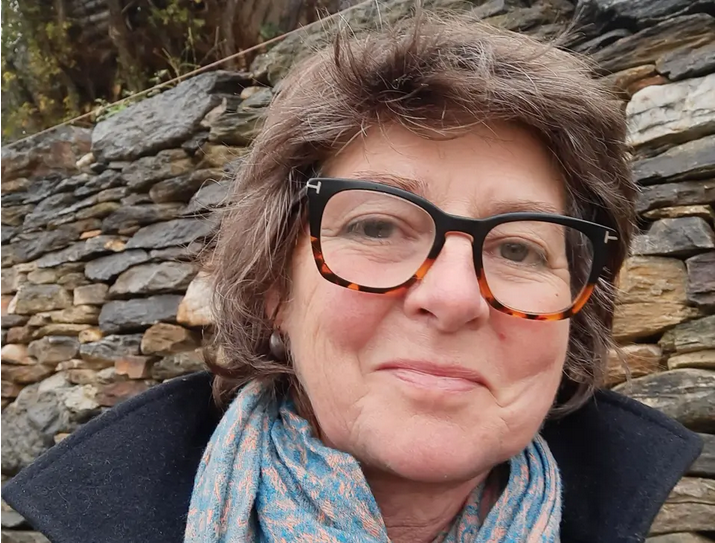Dry-stone wallers perform an ancient, essential craft that has enjoyed a renaissance in recent years. From graphic designers to yoga instructors, more and more people are changing careers to learn the skill.
In France, artisans now have access to a training school with a state-certified diploma, and public officials are keen to employ them for departmental reconstruction projects. Behind this return to prominence is a British woman, Cathie O’Neill, who fell in love with the French landscape while on holiday.
 “It is geologically diverse in Southern France. You have limestone, granite, schist (a shiny, flaky type of metamorphic rock) and sandstone. It is strangely similar to Cumbria in a way. Driving through the French landscape, I thought: “This is where I want to live,” Cathie O’Neill said. That was in 1989.
“It is geologically diverse in Southern France. You have limestone, granite, schist (a shiny, flaky type of metamorphic rock) and sandstone. It is strangely similar to Cumbria in a way. Driving through the French landscape, I thought: “This is where I want to live,” Cathie O’Neill said. That was in 1989.
At 23, she left London and her job for an entirely new life, coming to France on a four-year visa. She never went back. She met her husband, settled in that region, built her career as a dry-stone mason, and had two sons along the way.
 Ms O’Neill headed up an organization dedicated to dry-stone masonry, between 2006 and 2023. During her tenure, she helped restructure the entire sector, from top to bottom. “She presented the craft in a very instructional way and gained the trust of many mayors and public officials. She was very respected,” said a prominent dry-stone waller. She now focuses on consultancy work.
Ms O’Neill headed up an organization dedicated to dry-stone masonry, between 2006 and 2023. During her tenure, she helped restructure the entire sector, from top to bottom. “She presented the craft in a very instructional way and gained the trust of many mayors and public officials. She was very respected,” said a prominent dry-stone waller. She now focuses on consultancy work.
Below she talks about the dry-stone mason’s way of life, the humility and community spirit of its workers, what makes her proud, what can still be improved, and how the craft helped her to integrate into French life.
Around 2003 and 2004. I met a lot of people and I thought that craftworkers in the field ticked all the boxes. They had passion, technical skills, energy, and an admirable work ethic. What drove them the most was the urgent need to transmit their knowledge to the next generation before it was too late. I thought that was amazing.
I became a trainer. The goal was to create the first dry-stone walling school, plan its training courses before eventually creating the diplomas, and then take it to a European level. All of that was very exciting.
The fact that I was British, and that the only dry-stone walling certificate was British at that time, was an advantage. I had to set up visits to England, act as translator for the French, and set up meetings with everyone. French masons even took the British exams – in Cumbria – because we wanted them to learn the information they had about the culture there, which is very different to the savoir-faire of the Mediterranean.
By that time, French was no longer a problem for me because I had been living here for more than a decade. I probably know more technical terms in French than I do in English. Part of my job was not only about being on site, but about meetings with complex French institutions, national certification, bureaucracy, and working with unions. We had to work with all sorts of organizations that each used different vocabulary. For each job and network there were new words and a variety of acronyms. You have to learn all that.
The fact that I was immersed in a field populated by highly motivated craftworkers and curious locals helped immensely in terms of social integration. I definitely felt that I was giving something back to the place I had moved to. That was the energy of it. Having to work alongside both masons and public organizations helped a lot as well.
Dry-stone projects are photogenic and well-received, which helped me to build up a professional network. And there are more and more women coming in as well, something we are keen to encourage. We tell people that anyone can do this job. It is collective work, and does not have to be muscle-bound male-only. You do not have to be a big guy.
I do believe that people who come from elsewhere, specifically those originally from charming rural areas, will be sensitive to local architecture and building materials. British people certainly have that sensibility.
Both my sons work with stone. It goes down the generations. It is definitely a passion as well. There is great energy in this craft. And when you are part of it, you get so much back from it, such as knowledge and self-development. Manual work is good for both the community and the individual.
You can read the original article at www.connexionfrance.com
